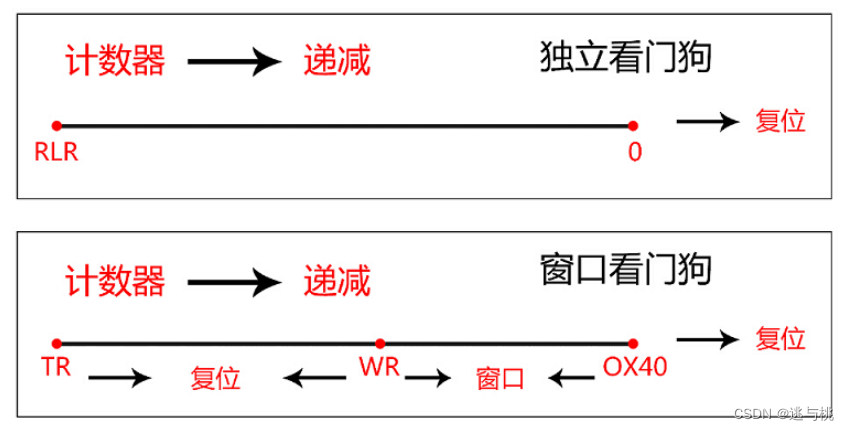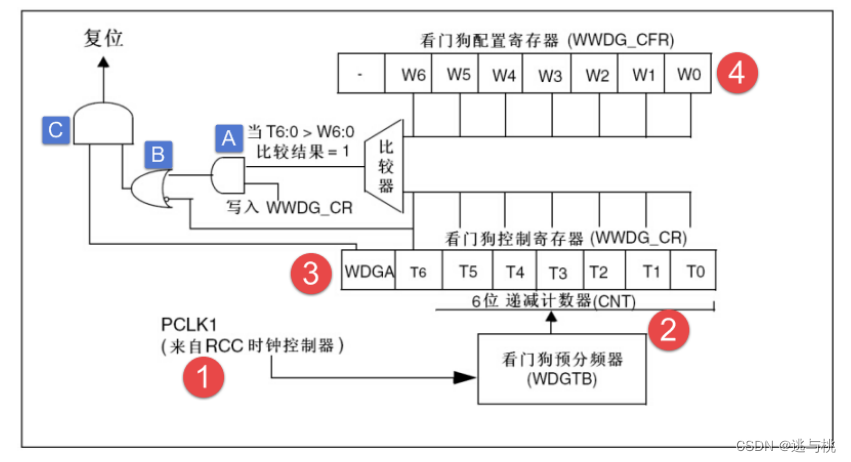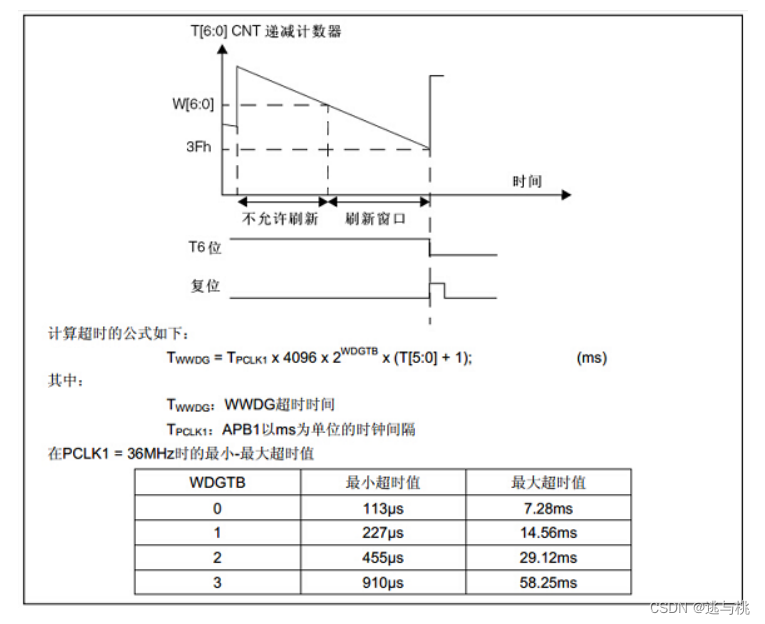WWDG---窗口看门狗
一.简介
窗口看门狗跟独立看门狗一样,也是一个递减计数器不断的往下递减计数,必须在一个窗口的上限值(用户定义)和下限值(0X40,固定不能变)之间喂狗不会复位,在上限值之前和下限值之后喂狗都会复位。

RLR 是重装载寄存器,用来设置独立看门狗的计数器的值;
TR?是窗口看门狗的计数器的值,由用户独立设置;
WR?是窗口看门狗的上窗口值,由用户独立设置。?
二.功能框图

1.窗口看门狗时钟
窗口看门狗时钟来自 PCLK1,PCLK1 最大是 36M,由 RCC 时钟控制器开启。
2.计数器时钟
?CNT_CK(计数器的时钟)=PCLK1/4096/(2^WDGTB);
CK 计时器时钟=PCLK1/4096;
分频系数 = (2^WDGTB);
计数器减一个数的时间 T= 1/CNT_CK = Tpclk1 * 4096 * (2^WDGTB)
3.计数器
窗口看门狗的计数器是一个7 位递减计数器。
当递减计数器递减到 0X40 的时候,还不会马上产生复位,如果使能了提前唤醒中断:CFR 位 9EWI 置 1,则产生提前唤醒中断,如果真进入了这个中断的话,就说明程序肯定是出问题了,那么在中断服务程序里面我们就需要做最重要的工作,比如保存重要数据,或者报警等,这个中断我们也叫它死前中断。
4.窗口值(上限值)
配置寄存器CFR 的位 6:0 W[6:0] 设置。
0X7F>上限值>oX40
如果我们要监控的程序段 A 运行的时间为 x,当执行完这段程序之后就要进行喂狗,如果在窗口时间内没有喂狗的话,那程序就肯定是出问题了。一般计数器的值 TR 设置成最大 0X7F,窗口值为 WR,计数器减一个数的时间为 T,那么时间:(TR-WR)*T 应该稍微小于 x?即可,这样就能做到刚执行完程序段 A 之后喂狗,起到监控的作用,这样也就可以算出 WR 的值是多少。
5.超时时间

三.使用案例
WWDG 一般被用来监测,由外部干扰或不可预见的逻辑条件造成的应用程序背离正常的运行序列而产生的软件故障。比如一个程序段正常运行的时间是 50ms,在运行完这个段程序之后紧接着进行喂狗,如果在规定的时间窗口内还没有喂狗,那就说明我们监控的程序出故障了,跑飞了,那么就会产生系统复位,让程序重新运行。
四.实验
systick.c
#include "systick.h"
// couter 减1的时间 等于 1/systick_clk
// 当counter 从 reload 的值减小到0的时候,为一个循环,如果开启了中断则执行中断服务程序,
// 同时 CTRL 的 countflag 位会置1
// 这一个循环的时间为 reload * (1/systick_clk)
void Delay_Us(uint32_t us)
{
uint32_t i;
SysTick_Config(SystemCoreClock/1000000);
for(i=0;i<us;i++)
{
// 当计数器的值减小到0的时候,CRTL寄存器的位16会置1
while( !((SysTick->CTRL)&(1<<16)) );
}
// 关闭SysTick定时器
SysTick->CTRL &=~SysTick_CTRL_ENABLE_Msk;
}
void Delay_Ms( uint32_t ms)
{
uint32_t i;
SysTick_Config(SystemCoreClock/1000);
for(i=0;i<ms;i++)
{
// 当计数器的值减小到0的时候,CRTL寄存器的位16会置1
// 当置1时,读取该位会清0
while( !((SysTick->CTRL)&(1<<16)) );
}
// 关闭SysTick定时器
SysTick->CTRL &=~ SysTick_CTRL_ENABLE_Msk;
}
systick.h
#ifndef _SYSTICK_H
#define _SYSTICK_H
#include "stm32f10x.h"
void Delay_Us(uint32_t us);
void Delay_Ms(uint32_t ms);
#endif
wwdg.c
#include "wwdg.h"
// WWDG 中断优先级初始化
static void WWDG_NVIC_Config(void)
{
NVIC_InitTypeDef NVIC_InitStructure;
NVIC_PriorityGroupConfig(NVIC_PriorityGroup_1);
NVIC_InitStructure.NVIC_IRQChannel = WWDG_IRQn;
NVIC_InitStructure.NVIC_IRQChannelPreemptionPriority = 0;
NVIC_InitStructure.NVIC_IRQChannelSubPriority = 0;
NVIC_InitStructure.NVIC_IRQChannelCmd = ENABLE;
NVIC_Init(&NVIC_InitStructure);
}
/* WWDG 配置函数
* tr :递减计时器的值, 取值范围为:0x7f~0x40
* wr :窗口值,取值范围为:0x7f~0x40
* prv:预分频器值,取值可以是
* @arg WWDG_Prescaler_1: WWDG counter clock = (PCLK1(36MHZ)/4096)/1
* @arg WWDG_Prescaler_2: WWDG counter clock = (PCLK1(36mhz)/4096)/2
* @arg WWDG_Prescaler_4: WWDG counter clock = (PCLK1(36mhz)/4096)/4
* @arg WWDG_Prescaler_8: WWDG counter clock = (PCLK1(36mhz)/4096)/8
*/
void WWDG_Config(uint8_t tr, uint8_t wr, uint32_t prv)
{
// 开启 WWDG 时钟
RCC_APB1PeriphClockCmd(RCC_APB1Periph_WWDG, ENABLE);
// 设置递减计数器的值
WWDG_SetCounter(tr);
// 设置预分频器的值
WWDG_SetPrescaler(prv);
// 设置上窗口值
WWDG_SetWindowValue(wr);
// 设置计数器的值,使能WWDG
WWDG_Enable(WWDG_CNT);
// 清除提前唤醒中断标志位
WWDG_ClearFlag();
// 配置WWDG中断优先级
WWDG_NVIC_Config();
// 开WWDG 中断
WWDG_EnableIT();
}
// 喂狗
void WWDG_Feed(void)
{
// 喂狗,刷新递减计数器的值,设置成最大WDG_CNT=0X7F
WWDG_SetCounter( WWDG_CNT );
}
wwdg.h
#ifndef __BSP_WWDG_H
#define __BSP_WWDG_H
#include "stm32f10x.h"
// 窗口计数器值,范围为:0x40~0x7f,一般设置成最大0X7F
#define WWDG_CNT 0X7F
void WWDG_Config(uint8_t tr, uint8_t wr, uint32_t prv);
void WWDG_Feed(void);
#endif
systick.h
/**
******************************************************************************
* @file Project/STM32F10x_StdPeriph_Template/stm32f10x_it.c
* @author MCD Application Team
* @version V3.6.0
* @date 20-September-2021
* @brief Main Interrupt Service Routines.
* This file provides template for all exceptions handler and
* peripherals interrupt service routine.
******************************************************************************
* @attention
*
* Copyright (c) 2011 STMicroelectronics.
* All rights reserved.
*
* This software is licensed under terms that can be found in the LICENSE file
* in the root directory of this software component.
* If no LICENSE file comes with this software, it is provided AS-IS.
*
******************************************************************************
*/
/* Includes ------------------------------------------------------------------*/
#include "stm32f10x_it.h"
#include "led.h"
/** @addtogroup STM32F10x_StdPeriph_Template
* @{
*/
/* Private typedef -----------------------------------------------------------*/
/* Private define ------------------------------------------------------------*/
/* Private macro -------------------------------------------------------------*/
/* Private variables ---------------------------------------------------------*/
/* Private function prototypes -----------------------------------------------*/
/* Private functions ---------------------------------------------------------*/
/******************************************************************************/
/* Cortex-M3 Processor Exceptions Handlers */
/******************************************************************************/
/**
* @brief This function handles NMI exception.
* @param None
* @retval None
*/
void NMI_Handler(void)
{
}
/**
* @brief This function handles Hard Fault exception.
* @param None
* @retval None
*/
void HardFault_Handler(void)
{
/* Go to infinite loop when Hard Fault exception occurs */
while (1)
{
}
}
/**
* @brief This function handles Memory Manage exception.
* @param None
* @retval None
*/
void MemManage_Handler(void)
{
/* Go to infinite loop when Memory Manage exception occurs */
while (1)
{
}
}
/**
* @brief This function handles Bus Fault exception.
* @param None
* @retval None
*/
void BusFault_Handler(void)
{
/* Go to infinite loop when Bus Fault exception occurs */
while (1)
{
}
}
/**
* @brief This function handles Usage Fault exception.
* @param None
* @retval None
*/
void UsageFault_Handler(void)
{
/* Go to infinite loop when Usage Fault exception occurs */
while (1)
{
}
}
/**
* @brief This function handles SVCall exception.
* @param None
* @retval None
*/
void SVC_Handler(void)
{
}
/**
* @brief This function handles Debug Monitor exception.
* @param None
* @retval None
*/
void DebugMon_Handler(void)
{
}
/**
* @brief This function handles PendSVC exception.
* @param None
* @retval None
*/
void PendSV_Handler(void)
{
}
/**
* @brief This function handles SysTick Handler.
* @param None
* @retval None
*/
void SysTick_Handler(void)
{
}
// WWDG 中断复服务程序,如果发生了此中断,表示程序已经出现了故障,
// 这是一个死前中断。在此中断服务程序中应该干最重要的事,
// 比如保存重要的数据等,这个时间具体有多长,要
// 由WDGTB的值决定:
// WDGTB:0 113us
// WDGTB:1 227us
// WDGTB:2 455us
// WDGTB:3 910us
void WWDG_IRQHandler(void)
{
// 清除中断标志位
WWDG_ClearFlag();
//LED2亮,点亮LED只是示意性的操作,
//真正使用的时候,这里应该是做最重要的事情
LED0(1);
}
/******************************************************************************/
/* STM32F10x Peripherals Interrupt Handlers */
/* Add here the Interrupt Handler for the used peripheral(s) (PPP), for the */
/* available peripheral interrupt handler's name please refer to the startup */
/* file (startup_stm32f10x_xx.s). */
/******************************************************************************/
/**
* @brief This function handles PPP interrupt request.
* @param None
* @retval None
*/
/*void PPP_IRQHandler(void)
{
}*/
/**
* @}
*/
main.c
#include "stm32f10x.h"
#include "led.h"
#include "systick.h"
#include "wwdg.h"
#include "key.h"
int main()
{
uint8_t wwdg_tr, wwdg_wr;
led_gpio_init();
LED1(1);
Delay_Ms(1000);
// 初始化WWDG:配置计数器初始值,配置上窗口值,启动WWDG,使能提前唤醒中断
WWDG_Config(0X7F, 0X5F, WWDG_Prescaler_8);
// 窗口值我们在初始化的时候设置成0X5F,这个值不会改变
wwdg_wr = WWDG->CFR & 0X7F;
while(1)
{
LED1(0);
//-----------------------------------------------------
// 这部分应该写需要被WWDG监控的程序,这段程序运行的时间
// 决定了窗口值应该设置成多大。
//-----------------------------------------------------
// 计时器值,初始化成最大0X7F,当开启WWDG时候,这个值会不断减小
// 当计数器的值大于窗口值时喂狗的话,会复位,当计数器减少到0X40
// 还没有喂狗的话就非常非常危险了,计数器再减一次到了0X3F时就复位
// 所以要当计数器的值在窗口值和0X40之间的时候喂狗,其中0X40是固定的。
wwdg_tr = WWDG->CR & 0X7F;
if( wwdg_tr < wwdg_wr )
{
// 喂狗,重新设置计数器的值为最大0X7F
WWDG_Feed();
}
}
}
本文来自互联网用户投稿,该文观点仅代表作者本人,不代表本站立场。本站仅提供信息存储空间服务,不拥有所有权,不承担相关法律责任。 如若内容造成侵权/违法违规/事实不符,请联系我的编程经验分享网邮箱:chenni525@qq.com进行投诉反馈,一经查实,立即删除!
- Python教程
- 深入理解 MySQL 中的 HAVING 关键字和聚合函数
- Qt之QChar编码(1)
- MyBatis入门基础篇
- 用Python脚本实现FFmpeg批量转换
- 安装 jupyter 运行python代码教程分享
- 揭秘淘宝APP商品原数据接口:引领电商数据革命,赋能开发者无限可能
- @RequestMapping注解与其派生注解接收参数详解
- python小项目:学生管理系统(可以让你满分的期末设计作业)
- 最新 robot framework安装
- 操作系统期末复习-设备管理
- 速卖通自养号测评系统有哪些?
- MidTool的AIGC与NFT的结合-艺术创作和版权保护的革新
- 《计算机网络管理》第四章 管理信息库思维导图
- RLHF 和 DPO:简化和增强语言模型的微调